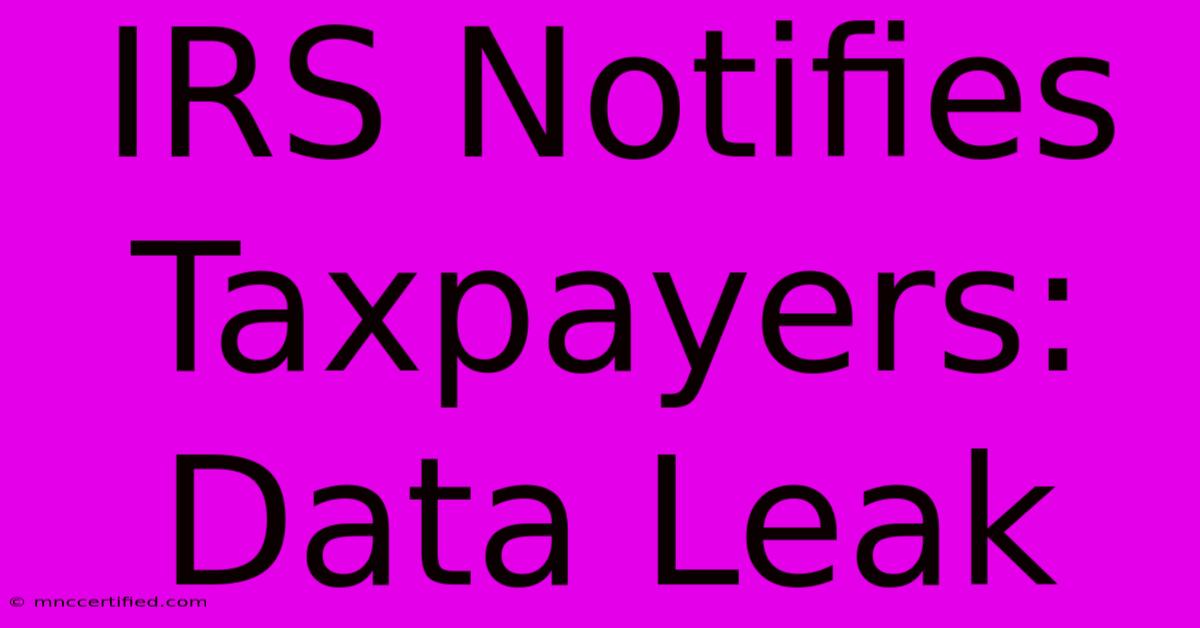IRS Notifies Taxpayers: Data Leak

Table of Contents
IRS Notifies Taxpayers: Data Leak – What You Need to Know
The Internal Revenue Service (IRS) recently notified taxpayers about a potential data leak. This alarming news has sent shockwaves through the nation, leaving many individuals concerned about the security of their personal and financial information. This article will break down the situation, explain what happened, and detail the steps you should take to protect yourself.
Understanding the IRS Data Leak
While the specifics surrounding the data breach are still unfolding, the IRS has confirmed that sensitive taxpayer information may have been compromised. This could include Social Security numbers (SSNs), addresses, dates of birth, and financial details. The extent of the breach and the number of affected individuals remain unclear, but the IRS is actively investigating the incident and working to mitigate the damage. This is not the first time the IRS has faced a data breach; past incidents underscore the ongoing need for robust cybersecurity measures.
What Caused the Data Leak?
The cause of the data leak is currently under investigation. The IRS has not yet publicly stated the precise method of intrusion, whether it was a phishing scam, a hacking incident, or some other form of cyberattack. However, the agency has assured taxpayers that they are taking the matter very seriously and are cooperating fully with relevant law enforcement agencies. Transparency surrounding the cause and subsequent actions will be crucial in regaining public trust.
Protecting Yourself After an IRS Data Leak
The potential consequences of a data breach involving sensitive tax information are severe. Identity theft, fraudulent tax returns, and financial fraud are all significant risks. Therefore, it’s crucial to take proactive steps to protect yourself:
Immediate Actions:
- Monitor your credit reports: Place a fraud alert or security freeze on your credit reports with all three major credit bureaus (Equifax, Experian, and TransUnion). This will make it more difficult for identity thieves to open new accounts in your name.
- Review your bank and credit card statements: Regularly check your accounts for any unauthorized transactions. Report any suspicious activity immediately to your bank or credit card company.
- Change your passwords: Update passwords for all online accounts, including your IRS online account, banking portals, and email. Use strong, unique passwords for each account.
- File your taxes early: Filing your taxes early can help you detect any fraudulent returns filed in your name.
Long-Term Protection:
- Enroll in IRS Identity Protection PIN (IP PIN): An IP PIN is a six-digit number that adds an extra layer of security to your tax information. It helps prevent fraudulent tax returns from being filed in your name.
- Stay vigilant: Regularly monitor your credit reports and bank statements for any unusual activity. Be wary of phishing scams and suspicious emails or phone calls claiming to be from the IRS.
- Consider identity theft insurance: Identity theft insurance can provide financial assistance and support services if you become a victim of identity theft.
The IRS's Response and Future Implications
The IRS's response to this data breach will be closely scrutinized. Their commitment to transparency and swift action is paramount in building back public confidence. This incident highlights the ongoing challenges faced by government agencies in protecting sensitive data in the digital age. Improved cybersecurity infrastructure and employee training are crucial steps in preventing future incidents. The long-term implications of this breach may include increased scrutiny of IRS security practices and potentially legislative changes aimed at enhancing data protection.
Keywords: IRS data leak, IRS data breach, tax information leak, identity theft, credit report, fraud alert, security freeze, IP PIN, IRS security, cybersecurity, data protection, taxpayer information, financial fraud, phishing scams.
This article provides a comprehensive overview of the situation, offering practical advice and emphasizing the importance of proactive measures. Remember to consult with a financial advisor or legal professional for personalized guidance. Staying informed and taking the necessary precautions is crucial to protect yourself in the wake of this concerning data leak.

Thank you for visiting our website wich cover about IRS Notifies Taxpayers: Data Leak. We hope the information provided has been useful to you. Feel free to contact us if you have any questions or need further assistance. See you next time and dont miss to bookmark.
Featured Posts
-
Bryant Park Holiday Market Fire
Dec 28, 2024
-
Yankees Torres Joins Tigers
Dec 28, 2024
-
Kessler Syndrome A Space Junk Crisis
Dec 28, 2024
-
Og Maco U Guessed It Passes Away
Dec 28, 2024
-
Arsenal In Second After 1 0 Premier League Win
Dec 28, 2024